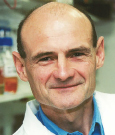Chris Marshall, FRS, FMedSci, a rigorous scientist with a lasting legacy of game-changing discoveries in cancer research and generous support for his younger colleagues, has died at 66. The cause of death was colorectal cancer.
Professor Marshall was the Head of the Division for Cancer Biology at the Institute of Cancer Research in London and Professor of Cell Biology, and held a Cancer Research UK Gibb Life Fellowship. He established an international reputation for his research into tumor cell signaling, with his major achievements including the discovery of the NRAS oncogene and the finding that oncogenic Ras proteins drive cancer cell proliferation through overactivation of the MAP kinase-signaling pathway. His research paved the way for four new classes of cancer drugs to enter the clinic, two of which have been approved for use in patient treatment today.
Field-Changing Discoveries
Professor Marshall studied Natural Sciences at Cambridge University, followed by a DPhil in cell biology at Oxford. His graduate studies were followed by postdoctoral work at the Imperial Cancer Research Fund (now Cancer Research UK) Lincoln’s Inn Fields Laboratories, and Dana-Farber Cancer Institute.
In 1980, Professor Marshall moved to The Institute of Cancer Research and began studies to identify human cancer genes. This work, in collaboration with his colleague, the late Alan Hall, PhD, resulted in the identification of NRAS, a new human oncogene. Subsequent work from his laboratory showed that NRAS has important roles in leukemia, and others demonstrated the role of NRAS in melanoma.
Following the identification of NRAS, Dr. Marshall concentrated on studying how NRAS and the two other RAS genes, HRAS and KRAS, act in cancer. His work in the field of cell signaling showed how RAS proteins are involved in transmitting signals from the outside of the cell to the cell nucleus. This work laid the foundation for studies that showed the importance of the BRAF cancer gene in melanoma.
His laboratory is currently studying the cell-signaling mechanisms that allow cancer cells to disseminate in the body. These studies are revealing how RHO family GTPase signaling pathways determine different ways for tumor cells to migrate during invasion.
Innovator and Mentor
Professor Marshall’s contributions to science have been recognized by election to the European Molecular Biology Organisation, the Royal Society, and the Academy of Medical Sciences.
He was awarded the Sterling Medal of the University of Pennsylvania (1997), the Novartis Medal of the Biochemical Society (1999), and the Buchanan Medal of the Royal Society (2008).
Both at the Institute of Cancer Research and in the wider scientific community, Professor Marshall was a highly valued colleague who went out of his way to help others. This willingness to mentor, support, and nurture talent has resulted in a cadre of successful scientists working in cancer research today.
His wife Lesley, his three children, and his four grandchildren survive Professor Marshall. ■


